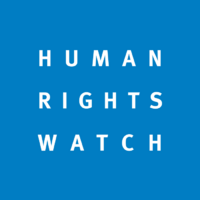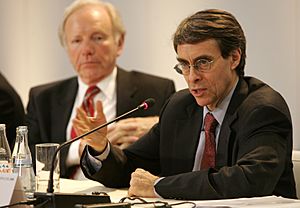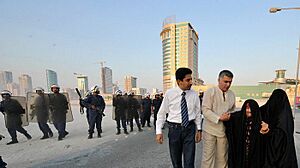Human Rights Watch facts for kids
 |
|
| Founded | 1978 (as Helsinki Watch) |
|---|---|
| Type | Non-profit, NGO |
| Focus | Human rights, activism |
| Headquarters | New York City, U.S. |
|
Area served
|
Worldwide |
| Product | Nonprofit human rights advocacy |
|
Executive Director
|
Federico Borello (Interim) |
|
Revenue
|
$85.6 million (2019) |
|
Employees
|
550+ |
Human Rights Watch (HRW) is a global group that works to protect human rights around the world. It is a non-governmental organization, which means it is not run by any government. HRW investigates and reports on many important issues. These include making sure children are not forced to work, stopping unfair treatment, and protecting the rights of women and LGBTQ+ people.
The organization also helps refugees, migrants, and people who are unfairly held in prison. HRW tries to convince governments, companies, and individuals to treat everyone with respect.
HRW started in 1978 as Helsinki Watch. Its first goal was to check if the Soviet Union was following human rights agreements. Over time, other "Watch" groups were formed for different parts of the world. In 1988, all these groups joined together to become Human Rights Watch.
HRW publishes reports each year about the human rights situation in many countries. In 1997, HRW was part of a group that won the Nobel Peace Prize. This was for their work to ban landmines. They also played a big part in the 2008 agreement to ban cluster bombs.
Contents
How Human Rights Watch Started
Human Rights Watch was created in 1978 by Robert L. Bernstein, Jeri Laber, and Aryeh Neier. It began as Helsinki Watch. This group watched to see if the Soviet Union was following the Helsinki Accords. These were agreements about human rights.
Helsinki Watch had a special way of working. They would publicly "name and shame" governments that were doing bad things. This meant they would tell the media and talk directly with leaders. By shining a light on human rights problems, they helped bring about democratic changes in the late 1980s.
Expanding the Watch Groups
After Helsinki Watch, other groups were formed. Americas Watch started in 1981. This was during a time of civil wars in Central America. Americas Watch investigated unfair actions by governments and rebel groups. They also looked at how foreign governments, like the United States, supported these regimes.
Later, Asia Watch (1985), Africa Watch (1988), and Middle East Watch (1989) were added. These groups were all known as "The Watch Committees." In 1988, they all came together to form Human Rights Watch.
Recent Challenges
Human Rights Watch continues to report on human rights issues globally. For example, in 2021, HRW released a report about the treatment of Palestinians. In 2020, the Chinese government took action against HRW's executive director, Kenneth Roth. This was because HRW supported the pro-democracy movement in Hong Kong. As a result, HRW decided to leave Hong Kong in October 2021. Their work on China and Hong Kong is now handled by their China team.
In March 2023, Bahrain stopped two HRW staff members from entering the country. They were supposed to attend a meeting there.
What Human Rights Watch Does
Human Rights Watch works to stop actions that go against basic human rights. These rights are listed in the Universal Declaration of Human Rights. HRW believes in freedoms like freedom of religion and freedom of the press. They also oppose things like the death penalty and unfair treatment based on who someone is.
HRW tries to make changes by putting public pressure on governments. They also try to convince powerful governments to influence those that violate human rights.
Research and Reports
HRW publishes detailed reports about human rights violations. These reports are based on international human rights rules. They help bring global attention to problems. This pressure encourages governments and international groups to make improvements.
Researchers from HRW go on fact-finding missions. They investigate situations and talk to victims. They also keep records and help protect people in dangerous situations. HRW works with local and international media to share their findings.
Their reports cover many topics. These include unfair treatment based on gender, unfair justice systems, and the use of children in wars. HRW has also documented violations of war laws, for example, in Yemen.
Supporting Activists and Awards
Human Rights Watch also helps writers around the world who are in danger because of their work. They offer financial help through the Hellman/Hammett grants. These grants also help raise awareness about activists who have been silenced for speaking up for human rights.
Each year, HRW gives out the Human Rights Defenders Award. This award honors activists who show great courage in defending human rights. These award winners often work closely with HRW.
Working with Other Groups
HRW is part of several important global groups. In 1998, it helped start the Coalition to Stop the Use of Child Soldiers. It also helps lead the International Campaign to Ban Landmines. This group successfully pushed for a treaty to ban anti-personnel landmines.
HRW is also a founding member of the International Freedom of Expression Exchange. This is a network of groups that watch for censorship around the world. They also helped create the Cluster Munition Coalition. This group led to an international agreement banning cluster bombs.
Global Presence
Human Rights Watch has more than 275 staff members. These include experts on different countries, lawyers, journalists, and academics. They work in over 90 countries. HRW has its main office in New York City. It also has offices in many other cities around the world.
HRW can usually access most countries they report on. However, some countries have blocked HRW staff from entering. These include Cuba, North Korea, Sudan, Iran, Israel, Egypt, and Venezuela.
Leadership
Kenneth Roth was the executive director of HRW from 1993 to 2022. He investigated human rights issues in places like Poland and Haiti. His interest in human rights came from his father's stories of escaping Nazi Germany.
Tirana Hassan was the executive director from 2023 until February 2025. She is a social worker who has worked with other major organizations like Médecins Sans Frontières and UNICEF.
How Human Rights Watch is Funded
Human Rights Watch gets its money from private individuals and foundations. It does not accept direct or indirect funding from governments. This helps HRW stay independent.
In 2010, George Soros, a well-known financier, promised to give HRW $100 million over ten years. This was the largest donation in HRW's history. It helped the organization grow its staff by 120 people. Soros wanted HRW to be seen as more international, not just an American group.
Organizations like Charity Navigator and the Better Business Bureau have given HRW good ratings for how it manages its money.
Images for kids
See also
 In Spanish: Human Rights Watch para niños
In Spanish: Human Rights Watch para niños
 | Misty Copeland |
 | Raven Wilkinson |
 | Debra Austin |
 | Aesha Ash |




